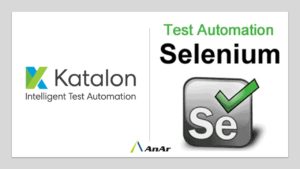In the ever-evolving realm of software testing, choosing the right automation tool can be the linchpin of success. Among a plethora of options, two heavyweights stand out: Katalon and Selenium. These tools have garnered attention for their distinct features and capabilities, each bringing its unique strengths to the table.
In this comprehensive blog, we will delve deep into the world of Katalon and Selenium, dissecting their pros and cons to help you make an informed decision for your testing endeavors. From seamless UI automation to robust API testing, we’ll explore the facets that set these tools apart. So, fasten your seatbelts, as we embark on a journey to uncover the secrets behind these automation titans.

What is Katalon Studio?
Katalon Studios was released in January 2015 as freeware with a Selenium-based engine. The main use of Katalon is to create and reuse automated test scripts for UI without coding. Katalon also offers running automated tests of UI elements, which also include iFrames, pop-ups and wait-time. Katalon is compatible with Linux, macOS, and Windows.
Compared to Selenium, it is easy to deploy and has a wide range of integrations. It also facilitates the users with different programming skills, with dual scripting features. The main advantage of this feature is for testers who carry very limited technical knowledge and use simple UI that do not require writing code.
API Testing: Testers can test APIs without additional integrations. With this, the tester can perform end-to-end API testing, automate scripting and maintain tests. This mode makes it easy to import tests from API testing and editing tools like WSDL, Swagger, and Postman. Apart from this, API testing offers an inbuilt response viewer with the auto-formatting facility and search for access to artifacts.
Web Testing: Katalon comes with inbuilt Continuous delivery/Continuous integration and DevOps integration along with support for Web, Android and IOS applications testing. Katalon’s web testing has multiple configurations and datasets. You can customize the workflow and run it automatically.
Mobile Testing: The user can test mobile Web, iOS, and Android apps. Through Appium, which is a test automation tool, it is possible to test the latest mobile platforms without any further installations. Katalon also accelerates the speed of mobile testing by detecting and storing objects.
Katalon Analytics: With the help of this module, the user can view test results and maintain test history. It also offers interactive dashboards and reports. Reports help to categorize the priority testing areas by highlighting the crucial parts. All execution is recorded in the form of screenshots and videos, and test results will be displayed on dashboards as specific KPIs. This module also comes with a feature that notifies email failure.
Katalon Recorder: Katalon comes with a Selenium-based recording module compatible with Chrome and Firefox. The user can record tests, perform debugging, automate test management, and allow testing scripts into Java, C#, Python, Ruby, Groovy and Robot Framework. Those without programming skills facilitate the record and playback feature which certainly saves the earlier methods used in testing.
Katalon Support
Katalon is a freeware tool offering technical support for different prices.
- For Business: One Helpdesk account, one support project, the response in 24-Hrs- $2,500 Per Year.
- For Enterprise: Three Helpdesk accounts, three support projects, the response in 24-Hrs – $5,000 Per Year
- Premiums for Enterprise: Exclusive Support with multiple accounts comes with a customizable price.
Pros of Katalon Studio
- Katalon is well-suited with several tools used in continuous integration and DevOps. Apart from this, Katalon also extends support to Slack, Git, qTest Manager and JIRA. Besides, it is combined with Jenkins & TeamCity, cloud C1 tools like Travis, SauceLabs, Selenium Grid, 12 CircleCI, Kobiton, and BrowserStack.
- Based on recorded scenarios, an inbuilt data-driven testing module facilitates the user to analyze tests. The displayed analytic results in the form of built-in-reports can be exported in various formats like PDF, Excel, CSV or HTML. These reports are very simple and easy to work with.
- Supports various types of testing:
- Keyword-driven: This is very much helpful for testers who are not experts in scripting.
- Data-driven: The data is collected from various sources like Excel files, CSV files, Data Pools, ADO Objects and ODBC.
- API-testing: It supports Databases, XML Datasources, and XLS with active mapping for enhanced test coverage.
- Cross-browser: Katalon supports almost all browsers- Firefox, Chrome, Safari, Headless, Internet Explorer, Edge – and customized environments.
- Katalon does not need additional integrations to run tests, and supports parallel execution in varied environments and can be accustomed to many frameworks. Integration with qTest, which is a centralized test management tool simplifies the communication of a QA team, allows for controlling test requirements, test case planning, and defect management.
- Katalon has a user-friendly UI with tree view, tables and menus which make the user’s job easy to manage test artifacts easily.
- Katalon’s both installation and usage is very easy. It is useful for beginners and advanced users, who can use the complete IDE and write advanced scripts. Developers can access multiple training video sessions and documentation.
Cons of Katalon Studio:
- Katalon only supports Groovy as a scripted language. This can be used only by the users well versed in Java language. But, users want more languages to be supported.
- Katalon emerged in 2015. Hence, the community is small and one may experience less support from peer testers. Users need to depend on paid customer support and forum replies.
- Being closed source code, this results in a smaller number of developers in the community. Selenium is an open-source tool offering engineers to customize it.
- The available documentation is lengthy, complicated and not updated as per the new version.
- Users witness bugs that affect testing by slowing it down.
Selenium is an open-source software testing automation tool. Selenium is widely used by Netflix, Google, HubSpot, Fitbit, and many more. The outstanding feature of Selenium is – it is the only free tool available in the market that can compete with paid tools. Selenium’s open-source facilitates a steep learning curve for startups.
Pros of Selenium
- Selenium offers portability across all platforms and no need to learn new languages. It also easily integrates with various development platforms such as SauceLabs, QMetry, Jenkins, Maven, TestNG, etc.
- Parallel testing with Selenium Grid enables developers to receive faster feedback and work immediately on changes instead of waiting for a longer period.
- With Selenium, users can also test native, hybrid or web mobile apps, though you will need supplementary software. The user’s main options are Appium and Selendroid. Both are based on Selenium so that developers well versed can apply the same logic and principle while testing mobile apps.
- Appium and Selendroid, both are open source and have fantastic community support. The main difference is – Appium supports Windows devices, Android and iOS. While Selendroid exclusively supports Android. Here, you must keep in mind that Selendroid bundles with Appium so whenever you test Android versions 2.3 through 4.3 the program will certainly switch to Selendroid.
- You may feel that using Appium makes more sense as it does not limit you to one OS. However, it is more sensible to go for Selendroid if you are testing only Android. It also comes with a few stylish features where you can plug-in devices and unplug them without distracting the tests.
- Selenium supports a wide array of languages, platforms and browsers. Primarily, Selenium supports ten languages which are JavaScript, C#, PHP, Java, Perl and R.
- Selenium occupies a 30.59% market share among all software testing tools. Whereas, its closest competitor achieves only 12%.
- Of course, you can find a substitute for Selenium, but if you compare pricing, it could range from a thousand dollars to 10k. Being a free and exceptional tool, Selenium has succeeded in keeping old testers loyal to Selenium, while new ones becomes a staunch follower.
- Another astounding functionality of Selenium is that it can be extended beyond its standard functionality with a wide array of plugins. Appium & Selendroid are one of them.
Cons of Selenium
- Today’s testing trend is codeless testing. Anyone without deep programming knowledge can perform tests. Selenium requires good knowledge of any one programming language.
- In the QA process, there is a difficulty in automating image verification. To do this, a simple and effective method is to check manually. To do this, Selenium needs third party software.
- Finding a solution to your problem, whether conventional or unconventional, is difficult. In that case, you need to contact consulting or service companies for further assistance. Selenium offers a very short list of such companies on their network page.
- The lack of automated reports is one of the major challenges of Selenium usage.
Katalon vs Selenium
| Feature | Katalon | Selenium |
|---|---|---|
| Release Year | January 2015 | 2004 |
| Main Use | UI Testing without coding | Web Automation |
| Compatibility | Linux, macOS, Windows | Cross-platform |
| Integration | Wide range, including Slack, Git, JIRA, Jenkins | Integrates with various development platforms |
| Supported Languages | Groovy | 10 languages including JavaScript, C#, Java |
| Community Size | Small | Large |
| Support | Paid technical support available | Limited community support, consulting needed |
| Scripting Skills | Suitable for testers with limited technical knowledge | Requires programming knowledge |
| API Testing | Built-in support | Requires additional integration |
| Mobile Testing | Web, iOS, Android | Supports mobile testing with additional software |
| Installation & Usage | Easy for beginners and advanced users | Requires programming skills |
| Reports & Analytics | Comprehensive with interactive dashboards | Limited, requires third-party software |
| Extensions & Plugins | Limited | Wide array of plugins available |
| Market Share | Not specified | 30.59% |
| Cost | Freeware with paid technical support options | Open-source, no additional cost |
Final Wrap-up
The choice between Katalon and Selenium boils down to your specific needs. Katalon offers an intuitive, code-free approach, while Selenium’s open-source flexibility is favored by experienced developers. Consider your project’s demands and team expertise to make the right call. Remember, the best tool is the one that aligns seamlessly with your goals. Happy testing!




